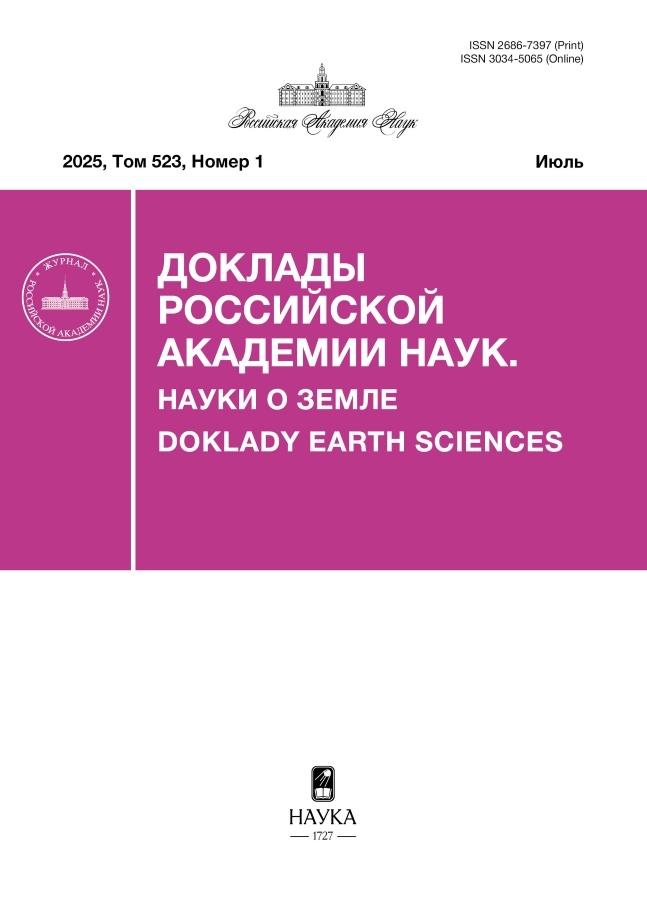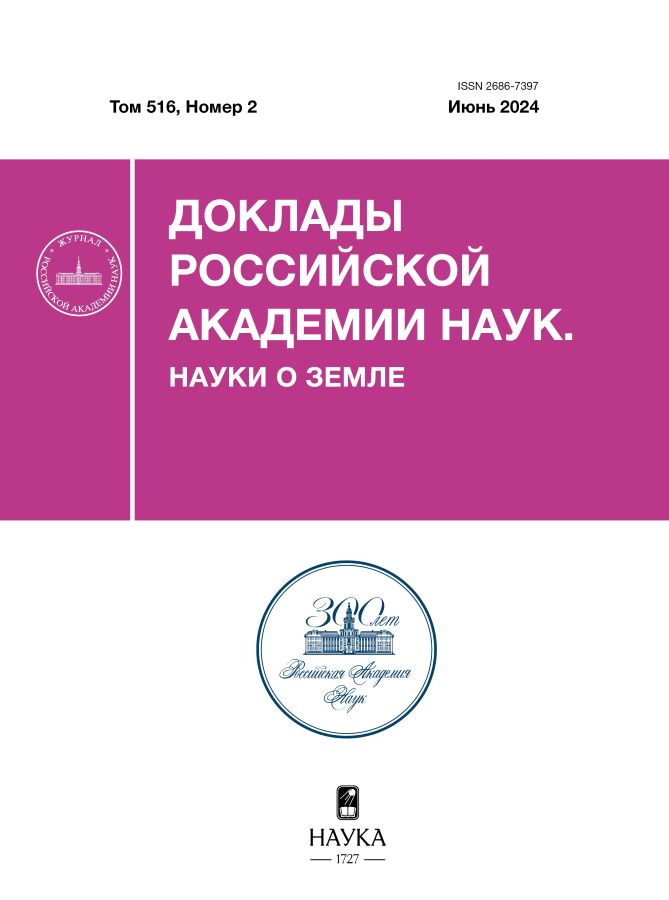Роль задугового бассейна в формировании гетерогенности слэба и происхождении вулканизма Курило-Камчатской островной дуги
- Авторы: Бергаль-Кувикас О.В.1, Гордеев Е.И.1, Кулаков И.Ю.2,3
-
Учреждения:
- Институт вулканологии и сейсмологии Дальневосточного отделения Российской Академии наук
- Сколковский институт науки и технологий Сколтех
- Институт нефтегазовой геологии и геофизики Сибирского отделения Российской Академии наук
- Выпуск: Том 516, № 2 (2024)
- Страницы: 600-605
- Раздел: ВУЛКАНОЛОГИЯ
- Статья получена: 31.01.2025
- Статья опубликована: 12.12.2024
- URL: https://cijournal.ru/2686-7397/article/view/650048
- DOI: https://doi.org/10.31857/S2686739724060126
- ID: 650048
Цитировать
Полный текст
Аннотация
Проведён анализ проявлений вулканизма вдоль Курило-Камчатской островной дуги (ККОД). На основании геофизических наблюдений показаны вариации параметров слэба. Изменение угла наклона слэба формирует различную ширину вулканического пояса на севере и юге ККОД. Резкие изменения скорости движения слэба в центральном сегменте ККОД, возможно, генерируют рифтовую систему пролива Буссоль. Высказывается предположение о доминирующей роли задугового бассейна в формировании различных параметров слэба и проявлений вулканизма вдоль ККОД.
Ключевые слова
Полный текст
Об авторах
О. В. Бергаль-Кувикас
Институт вулканологии и сейсмологии Дальневосточного отделения Российской Академии наук
Автор, ответственный за переписку.
Email: kuvikas@mail.ru
Россия, Петропавловск-Камчатский
Е. И. Гордеев
Институт вулканологии и сейсмологии Дальневосточного отделения Российской Академии наук
Email: kuvikas@mail.ru
академик РАН
Россия, Петропавловск-КамчатскийИ. Ю. Кулаков
Сколковский институт науки и технологий Сколтех; Институт нефтегазовой геологии и геофизики Сибирского отделения Российской Академии наук
Email: kuvikas@mail.ru
член-корреспондент РАН
Россия, Москва; НовосибирскСписок литературы
- Sakhalin Volcanic Eruptions Response Team (SVERT) website. URL: http://www.imgg.ru/ru/teams/svert (date of application: January 10, 2024)
- Авдейко Г. П., Антонов А. Ю., Волынец О. Н. и др. Подводный вулканизм и зональность Курильской островной дуги. М.: Наука, 1992. 528 с.
- Злобин Т. К., Поплавская Л. Н., Полец А. Ю. Серия сильных и катастрофических Симуширских землетрясений 2006–2009 гг. // Доклады РАН. Науки о Земле. 2009. Т. 428. № 4. С. 531–535.
- Мартынов Ю. А., Рыбин А. В., Дриль С. И. и др. Зоны аномального вулканизма Курильских островов, остров Парамушир // Вестник Дальневосточного отделения Российской академии наук. 2009. № 4. С. 17–23.
- Мартынов А. Ю. Роль задуговых процессов в формировании поперечной геохимической зональности вулканитов ранних этапов становления о-ва Кунашир // Петрология. 2013. Т. 21. № 5. С. 517–517.
- Baranov B. V., Werner R., Hoernle K. A. et al.Evidence for compressionally induced high subsidence rates in the Kurile Basin (Okhotsk Sea) // Tectonophysics. 2002. 350. 1. P. 63–97. https://doi.org/10.1016/S0040-1951(02)00081-1
- Werner R., Baranov B., Hoernle K. et al. Discovery of ancient volcanoes in the Okhotsk Sea (Russia): New constraints on the opening history of the Kurile Back Arc Basin // Geosciences. 2020. 10 (11). https://doi.org/442.10.3390/geosciences10110442
- Syracuse E. M., Abers G. A. Global compilation of variations in slab depth beneath arc volcanoes and implications // Geochemistry, Geophysics, Geosystems. 2006. V. 7. № 5. P. 1–18. https://doi.org/10.1029/2005GC001045
- Бергаль-Кувикас О. В. Объемы четвертичных вулканитов Курильской островной дуги: анализ пространственного расположения и связь с зоной субдукции // Тихоокеанская геология. 2015. 34. 2. C. 103–116.
- Volcano Global Risk Identification and Analysis Project (VOGRIPA) website. URL: https://vogripa.org/ (date of application: July 21, 2020)
- Кулаков И. Ю., Добрецов Н. Л., Бушенкова Н. А. и др. Форма слэбов в зонах субдукции под Курило-Камчатской и Алеутской дугами по данным региональной томографии // Геология и геофизика. 2011. Т. 52. № 6. С. 830–851.
- Кулинич Р. Г., Карп Б. Я., Баранов Б. В. и др. О структурно-геологической характеристике” сейсмической бреши” в центральной части Курильской островной гряды // Тихоокеанская геология. 2007. Т. 26. № 1. С. 5–19.
- Kimura G. Oblique subduction and collision: Forearc tectonics of the Kuril arc // Geology. 1986. 14. 5. Р. 404–407. https://doi.org/10.1130/0091-7613(1986)14<404:OSACFT>2.0.CO;2
- Billen M. I., Hirth G. Rheologic controls on slab dynamics // Geochemistry, Geophysics, Geosystems. 2007. 8. 8. https://doi.org/10.1029/2007GC001597
- Ikeda Y., Stern R. J., Kagami H. et al. Pb, Nd, and Sr isotopic constraints on the origin of Miocene basaltic rocks from northeast Hokkaido, Japan: Implications for opening of the Kurile back‐arc basin // Island Arc. 2000. 9. 2. P. 161–172. https://doi.org/10.1046/j.1440-1738.2000.00269.x
- Yamashita S., Shuto K., Karihara Y. et al. Coeval volcanism due to interaction of back-arc basin basalt (BABB) magma with the island-arc crust in the late Miocene Engaru volcanic field, northeastern Hokkaido, Japan: The evidence of Sr and Nd isotopic ratios combined with major-and trace-element compositions // Journal Geological Society of Japan. 1999. 105. 9. P. 625–642. https://doi.org/10.5575/geosoc.105.625
- Kneller E. A., van Keken P. E. Effect of three‐dimensional slab geometry on deformation in the mantle wedge: Implications for shear wave anisotropy // Geochemistry, Geophysics, Geosystems. 2008. 9.1. https://doi.org/10.1029/2007GC001677
- Прошкина З. Н., Кулинич Р. Г., Валитов М. Г. Структура, вещественный состав и глубинное строение океанского склона Центральных Курил: новые детали // Тихоокеанская геология. 2017. Т. 36. № 6. С. 58–69.
- Бергаль-Кувикас О. В., Буслов М. М., Бушенкова Н. А. и др. Переход от континентальной окраины Камчатки к островной дуге Курильских островов: Особенности проявления вулканизма, деформации земной коры и геофизические параметры слэба // Геология и геофизика. 2023. Т. 10. № 64. С. 1469–1484. https://doi.org/10.15372/GiG2023136
- Злобин Т. К., Полец А. Ю. Неоднородная (блоково-клавишная) структура Курильской островной дуги и сейсмофокальной зоны // Общие и региональные проблемы тектоники и геодинамики. 2008. 1. С. 333–336.
Дополнительные файлы















